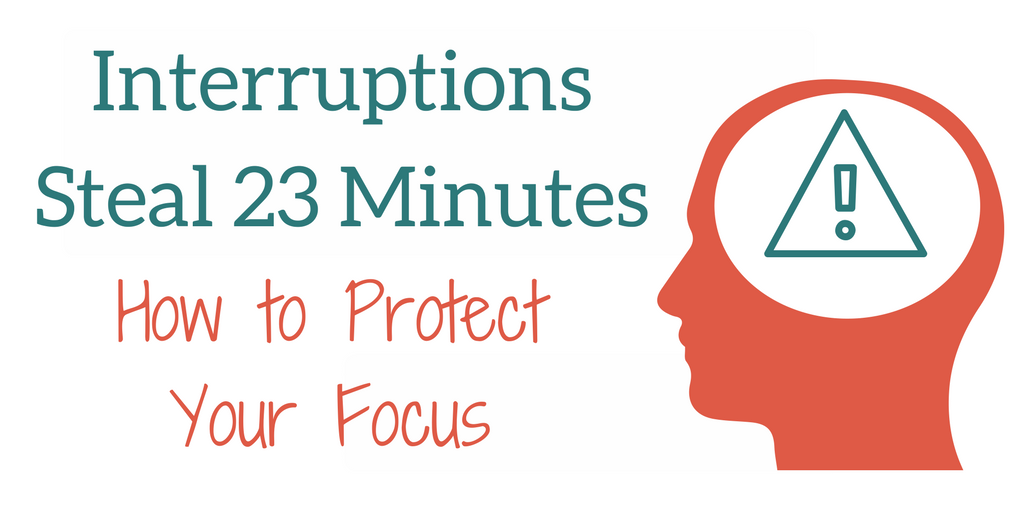Your brain tricks you constantly. You think you are a good multitasker. It never feels like your attention and focus suffer when you quickly answer a text message during a writing session. In fact, you’re able to get right back to your work.
The science tells a different story, one that will forever change how you see task switching and interruptions.
What do studies find? Whenever your attention is drawn elsewhere it takes 23 minutes and 15 seconds to fully mentally return to the interrupted task.
Can you afford to lose 23 minutes of what Cal Newport calls “deep work” every writing session?
If not, it’s time to see interruptions for how cognitively devastating they can be and to take steps to minimize them.
Continuous Partial Attention and Reframing Interruptions
Our mobile, hyper-connected world means that we are more interrupted than ever. In fact, scientists have even developed a term to describe what seems to be our default mental state: “continuous partial attention.” Without vigilance and deliberate planning this state of shallow focus often “just happens.”
Sometimes, you can’t avoid interruptions. You’re grading in your office when your colleague stops by to catch up.
But more often than not, we subconsciously sabotage our own focus.
Because we can’t truly feel the full cognitive effects of task switching, we think these interruptions are harmless. We allow ourselves to check email quickly–or worse, to leave our email window open in the background–during a writing session.
If we never go 23 minutes without an interruption, though, we can never do “deep work.” In short, these constant interruptions mean we never reach the state of deep focus and attention academic research and writing requires.
To take back your focus, start by labeling interruptions for what they are: 23 minutes of “deep work” lost.
How to Fight Interruptions and Digital Distractions
As mentioned above, professors cannot prevent all interruptions, but you can greatly reduce them. Try these tips to protect your focus, curb digital distractions, and be more productive during your writing time.
Reduce phone call/text/notification interruptions
Turn off your phone. If you cannot turn it off, use “Do not Disturb” mode (which will allow only certain callers through). Or, silence it and check it at pre-established intervals. Keep your phone in a different room. If you can’t do that, keep the screen face down.
Combat the urge to reach for your phone
Feel the urge to reach for your phone? Ask “do I have 23 minutes to spare?” and act accordingly.
For a do-it-yourself guide to fundamentally change your relationship to your phone, check out How to Break up with Your Phone.
Remove the apps you are most likely to reach for, or put them in a folder (so you don’t see them immediately) on a different page. Or, set your iPhone to greyscale to make it feel like more of a “tool” than a “toy.”
Reduce email interruptions
Use an Internet blocker (such as WasteNoTime for Safari and Chrome) to block email websites during certain hours. Or, use an add-on such as Boomerang for Gmail, which allows you to “Pause” emails during certain hours, which prevents them from showing up in your inbox until a set time. Set your phone to “fetch” email (rather than “push” email). Turn off email notifications on your phone and computer. Never leave email open in the background.
Limit other computer interruptions (Mac users)
Set up “Do Not Disturb” mode and/or set all program notifications to “none” (Settings > Notifications) instead of “banner” or “alerts.” Make it a habit of always clicking on “Do Not Allow” any time a website asks for permission to send you push notifications.
Decrease in-person interruptions at home
Talk with your significant others and/or children about interruptions and together develop a system that works for you. Be sure to talk about what constitutes emergencies and necessary interruptions. Some ideas might include leaving the house to work, putting a special sign on a closed door to indicate whether you can be interrupted, or setting agreed-upon times to check in. Or consider some of these suggestions from Lifehacker.
Use an Opening Routine to Segment Your Time
You will be more likely to maintain focus during your writing time (and fight interruptions) if you treat your writing time as sacred. You give your writing your full attention during this time. Using an opening routine to begin your writing sessions can reinforce that this time is for deep work.
Your Turn
What strategies do you plan to try to protect focus and maintain productivity? What seems to be your current digital distraction weakness? Do you have other suggestions for how professors can fight interruptions? Did this article inspire you to make a change, however small? I’d love to hear about it in the comments below or by email!
